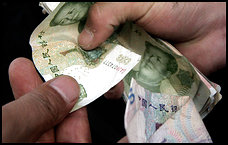WTO advices China to reconsider currency policy
China should adopt a more flexible currency exchange rate policy and must do more to stamp out piracy, the World Trade Organization will report in its first trade review of the Asian country, according to a summary obtained Friday by The Associated Press. The WTO's trade review, scheduled for release on April 10, will praise China for economic reforms made over the last three decades, which have helped cut by over half the amount of Chinese living in poverty and increase gross domestic product per capita nine-fold.

Commitments made by China to join the WTO in 2001 "have provided a catalyst for reform, paving the way for continuing strong growth in the foreseeable future," the global commerce body said in the summary. But "a number of challenges remain," the WTO said, citing China 's currency policy, protection of intellectual property rights and slow liberalization of key service sectors such as banking and telecommunications.
The report makes no mention of a recent thaw in trade hostilities between China and the United States , which has been bogged down by Washington 's US$202 billion ( Ђ 168 billion) trade deficit with the Asian country and has centered on the valuation of the Chinese yuan.
American manufacturers contend China is blatantly manipulating its currency, keeping it undervalued by as much as 40 percent, to make Chinese goods cheaper for American consumers and U.S. products more expensive in China . According to the WTO, "the move to a more flexible exchange rate could enable China to operate a more independent monetary policy and allow the market to play a greater role in determining interest rates and therefore in allocating resources."
China raised the yuan's value by 2.1 percent against the U.S. dollar when it changed its exchange rate system in July, basing the value of the yuan on a group of global currencies and allowing limited fluctuation. But the U.S. and other countries have been pressing Beijing to raise the yuan's value further.
Senators Charles Schumer, a New York Democrat, and Lindsay Graham, a South Carolina Republican, are sponsoring legislation that would impose across-the-board penalty tariffs of 27.5 percent on Chinese goods unless the Chinese stop the practice.
Congress could take "extreme action" if Beijing does not move soon toward economic reform, Graham told a congressional advisory panel Thursday. The administration of U.S. President George W. Bush also has been stepping up the heat on China over intellectual property rights. U.S. officials say rampant Chinese copying of movies, music, software and other goods costs legitimate products worldwide up to US$50 billion ( Ђ 41 billion) annually in lost potential sales.
Last month, U.S. Trade Representative Rob Portman announced the creation of a new China enforcement task force in his office and indicated that without progress soon on piracy, as well as high Chinese tariffs imposed on American auto parts, the administration would probably file unfair trade cases against China before the WTO.
The Geneva-based trade organization said "effective enforcement of intellectual property rights is also needed to ensure an investment environment conducive to the development of an innovative private sector and foreign investment." "Steps have been taken to ensure better enforcement and coordination between the various government agencies involved in enforcement," the WTO said. However, China 's relatively low fines and lenient penalties "appear insufficient to deter (intellectual property rights) violations."
The summary did not address Chinese policy on automotive parts specifically, but said Chinese manufacturing has boomed partly as a result of government assistance and public investment. "The result is that manufacturing, especially export-oriented manufacturing, has developed more rapidly than other sectors," the WTO said.
The European Union also has moved recently to counter what it calls unfair trade practices by China . On Thursday, the 25-nation EU announced it would soon slap duties on Chinese and Vietnamese shoes, acting against a flood of cheap imports that it says breaks world trade rules.
The WTO's report will also examine Chinese services, where liberalization has been much slower than in other economic sectors. "Banking, insurance, telecommunications, and transport services are characterized by significant state ownership and little private, especially foreign, presence," the summary said.
Four majority state-owned banks hold 54 percent of banking assets in the country and insurance is dominated by six state holding companies accounting for 85 percent of all premiums, the WTO noted. In telecommunications, six majority state-owned companies dominate basic services, even if private firms are largely responsible for value-added services. Air and maritime transport services are similarly controlled by majority or fully state-owned enterprises, WTO said, reports the AP.
N.U.
Subscribe to Pravda.Ru Telegram channel, Facebook, RSS!




